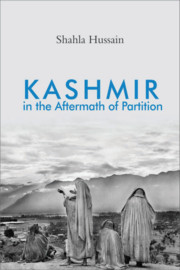Book contents
- Frontmatter
- Dedication
- Contents
- Acknowledgments
- Introduction
- 1 Meanings of Freedom in the Princely State of Jammu and Kashmir
- 2 Freedom, Loyalty, Belonging: Kashmir after Decolonization
- 3 Puppet Regimes: Collaboration and the Political Economy of Kashmiri Resistance
- 4 The Idea of Plebiscite: Discontent and Regional Dissidence
- 5 Mapping Kashmiri Imaginings of Freedom in the Inter-regional and Global Arenas
- 6 Jang-i-Aazadi (War for Freedom): Religion, Politics, and Resistance
- Conclusion
- Select Bibliography
- Index
Conclusion
Published online by Cambridge University Press: 15 January 2021
- Frontmatter
- Dedication
- Contents
- Acknowledgments
- Introduction
- 1 Meanings of Freedom in the Princely State of Jammu and Kashmir
- 2 Freedom, Loyalty, Belonging: Kashmir after Decolonization
- 3 Puppet Regimes: Collaboration and the Political Economy of Kashmiri Resistance
- 4 The Idea of Plebiscite: Discontent and Regional Dissidence
- 5 Mapping Kashmiri Imaginings of Freedom in the Inter-regional and Global Arenas
- 6 Jang-i-Aazadi (War for Freedom): Religion, Politics, and Resistance
- Conclusion
- Select Bibliography
- Index
Summary
He doesn't know whose land is this
Nor does he know whose land is that
As he limps on his lone limb
And a pair of crutches
Following his fearful flock…
While once he used to sprint
Wild spirited and free
And tame his wild flock
With a youthful yell
Unhindered across the mountains and meads…
A loud bang blows off his limbs…
Ah! He doesn't know
That Tiffin sized box is a landmine
Sown across the barbed line
That slices the heart of the land
He once roamed around freely
—Mohammad Zahid, “The Line of Control”Narrating the experiences of a wounded shepherd tending his flock in the meadows close to the “border,” Kashmiri poet Mohammad Zahid captures the physical pain and emotional trauma caused by the arbitrary legal division of the former princely state of Jammu and Kashmir. At the same time, his verses illuminate the irrelevance of such borders in the Kashmiri psyche and the desire to transgress this divide, to “roam freely” in their homeland without the constraints and restrictions of its militarized landscape. In the aftermath of partition, as India and Pakistan laid claims to Kashmir's territory, Kashmiris struggled to come to grips with the ceasefire line and their own presence within the new political constructs of India and Pakistan.
But the division of Kashmir, like other partitions in the South Asian subcontinent, has failed to bring peace. Instead, the trauma of partition continues to unfold in Kashmir as both warring neighbors remain frozen in time, each claiming Kashmir as the cornerstone of its national identity. Its territory is a battleground for real and proxy wars between rival nations, who flex their military muscles and demonstrate their willingness to use force to protect what they perceive to be their national interests. In the power struggle between India and Pakistan, the concept of territorialism and national security has long taken precedence over the aspirations of Kashmiris and helped make managing the situation, rather than resolving it, the priority. Unless both countries break the mold of past practice and understand that any long-term political resolution in Kashmir will require less reliance on national security and militaristic methods and more on human security, there can be no lasting peace in the region.
- Type
- Chapter
- Information
- Kashmir in the Aftermath of Partition , pp. 349 - 360Publisher: Cambridge University PressPrint publication year: 2021



